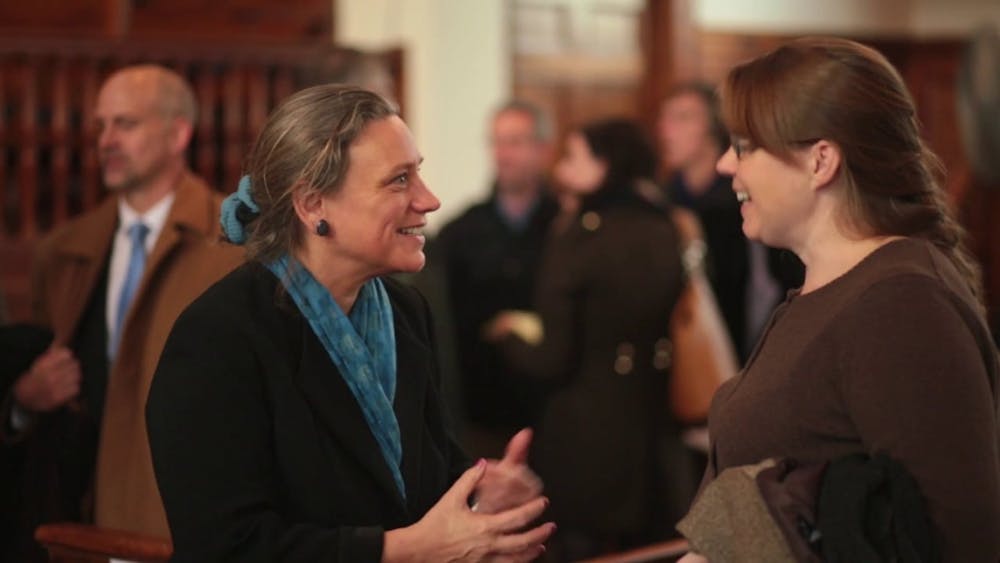With an eye on the horizon after announcing her departure last May, Middlebury College President Laurie Patton has since led her final Commencement ceremony, conducted her final Board of Trustees meeting in October, and, now, sat for her final interview with The Campus.
The days of seeing her strolling outside Old Chapel with her dog Suka are numbered, and spotting her at Nocturne is now a fond memory rather than a distinct possibility; starting next month Patton’s emails (and occasional poem) will no longer land in our Outlook inboxes.
Amidst her preparations to depart the college and begin her new role as president of the American Academy of Arts and Sciences, Patton met with us in November to reflect on her tenure at Middlebury and what faces the next president of the college.
Patton has worked on several large projects in her time at Middlebury, from Energy2028 — an initiative to transition the college to using 100% renewable energy sources by 2028 — to efforts in the Conflict Transformation Collaborative.
Patton emphasized how important it will be for the next president to jump right into managing and garnering funding for these projects while continuing to work on reaching a 5% spend rate for the college endowment. That figure currently stands just above 5.5%, according to Patton, marking significant progress on the college’s financial well-being since she stepped into office.
“We've really pushed on creating a stable environment for Middlebury where we're not spending our reserves and that was not the case when I got here, and I think everyone is piled in and really done it well,” Patton said.
She has overseen the early years of the “For Every Future: The Campaign For Middlebury” fundraising campaign, which has already raised over $485 million towards its goal of $600 million by 2028. Under her tenure, the college has announced plans to demolish Battell Hall and replace it with a new art museum, which Patton hopes will centralize the arts scene on campus long after she departs next month.

Patton said the next president must also guide Middlebury through the threat posed to higher education by the incoming Trump administration.
“The main thing we need to do is think about protecting our students now in anticipation of what might happen, which is the art of administration,” Patton said. “I think it would be better for us to lock down the preventative measures just in case, rather than go down a rabbit hole of planning for 20 different scenarios when we don't know exactly what's going to happen.”
Maintaining community, inclusivity and a sense of belonging will be important in approaching the uncertainty that lies ahead, Patton said.
She also reflected on the student protests that have transpired at Middlebury during her time as president and on the importance of productive arguments.
“The fundamental right to freedom of expression is the bedrock for all of us, and I think we need to be super clear on that and and then move to being super clear on how we think about protest policies in terms of time, place, and manner. That is a separate thing,” she said. “And as long as those kinds of guardrails are put in place, we should have a strong tradition of students speaking out on things they care about.”
Protests have rocked Middlebury’s regular routine, from backlash to Charles Murray in 2017 to the Gaza Solidarity Encampment last May; these protests have forced a reckoning with a vision of Middlebury that Patton described in her 2015 inaugural address as a place “impassioned arguments” should be encouraged to thrive.
Patton shared her memories of student protests and such arguments at the college. Not every student and administrator involved in planning Energy2028 agreed on the best way to carry it out, nor on whether or not to reduce the credit requirement to tackle student stress, nor on how to best promote the arts on campus in conversations about Nocturne Arts Festival, an annual campus tradition Patton is particularly passionate about.
“If we want to have really faithful arguments with more wisdom and deeper respect, the arts is a very powerful way to do that. And the people who've told us that and taught us that are our students, and they continue to be students,” she said.
In recent months, the offices of college and university presidents across the country have come under intense scrutiny, especially in light of increased student protest movements surrounding the war in Gaza and discussions about the role of higher education institutions in a world of emerging AI. Patton addressed the criticism and doubt that college presidents face, commenting that many people overlook the president’s commitment to their institution in lieu of more speculative claims about personal gain.
“People often don't understand that you're actually not in the job for the ulterior motive thing, and everyone on your team is about service to the institution. I do really believe that Middlebury ethos of having a low ego and high impact,” Patton said.
Patton also mentioned that, as the college’s first female president, she faced a particular brand of skepticism; she said that, when intentionally taking time to make an administrative decision, Patton said she was often labeled as indecisive rather than thoughtful.
Patton holds her scholarship and role as an intellectual leader close, having taught courses in religion during her time at Middlebury. She mentioned how the Bhagavad Gita, a Hindu scriptural text, has shaped her approach to leadership.
“The fundamental teaching of the Gita is that you should do what's right. Then you have to also educate yourself on what the best moral choice is in any given situation. In my case, it was what's right for Middlebury,” Patton said. “When you're in a tough spot as a leader in a hyperpolarized world, the only thing you can do is carry yourself with dignity and be true to your values.”
Patton said her original plan was to stay on until 2028, when more projects would be accomplished, but she still feels proud of her nearly 10 years spent at the college. She credited these achievements to the synergy between her own visions and the aspirations of the broader Middlebury community.
“Every single dream I've had to build at Middlebury, I’ve been able to accomplish either fully or mostly, and that's an extraordinary thing to say. It speaks so well of the fit between what I wanted to accomplish and what the community was willing to do,” Patton explained.
With those projects now coming to fruition, Patton will move on to the American Academy of Arts and Sciences in January, where she will serve as president after first being elected to the Academy’s membership in 2018.
Still, despite her departure, Patton said Middlebury will remain important to her (she plans to maintain a residence in Shoreham, Vt.), and she remains faithful in the spirit of the school and the people who make it.
“I would say I have profound confidence that Middlebury’s soul is only going to get brighter, even in some pretty turbulent times ahead,” she said.


Cole Chaudhari ’26 (he/him) is a Managing Editor.
Cole is a managing editor at The Campus, where he has previously served as a news editor, copy editor, and staff writer. He is a junior, and is studying history and literature.

Ryan McElroy '25 (he/him) is the Editor in Chief.
Ryan has previously served as a Managing Editor, News Editor and Staff Writer. He is majoring in history with a minor in art history. Outside of The Campus, he is co-captain of Middlebury Mock Trial and previously worked as Head Advising Fellow for Matriculate and a research assistant in the History department. Last summer Ryan interned as a global risk analyst at a bank in Charlotte, North Carolina.

Madeleine Kaptein '25.5 (she/her) is a managing editor.
Madeleine previously served as a staff writer, copy editor and local editor. She is a Comparative Literature major with minors in German and Art History. In Spring 2024, she studied abroad in Mainz, Germany, from where she wrote for the Addison Independent about her host country. In her free time, she enjoys journaling, long walks and runs, and uncomplicated visual arts projects.




